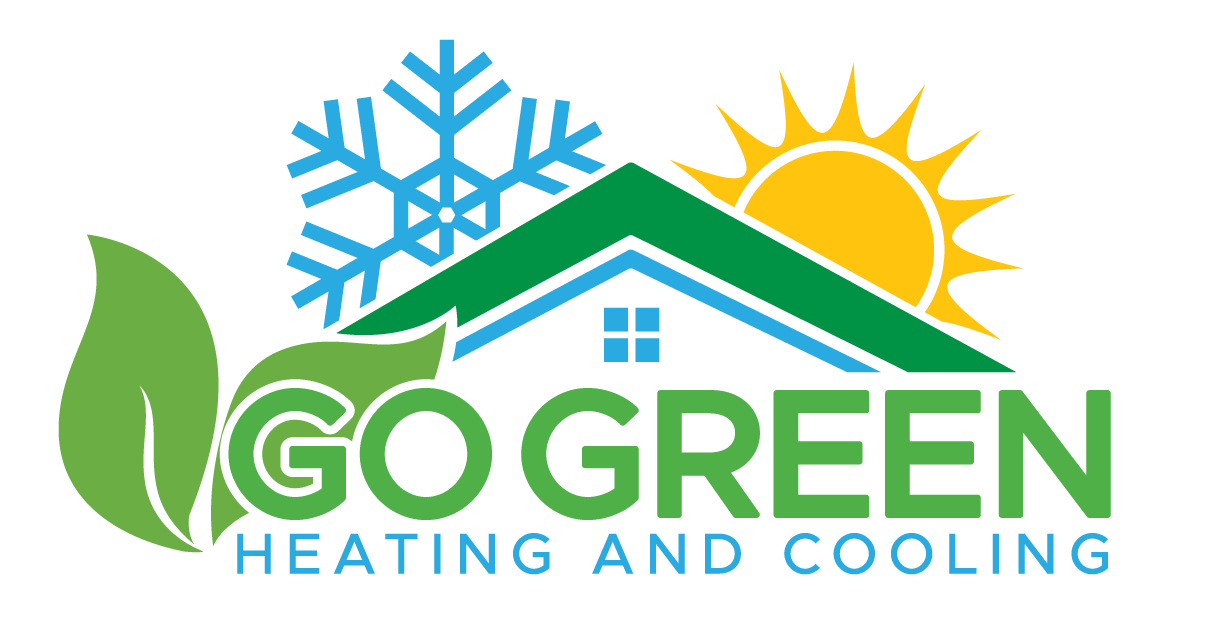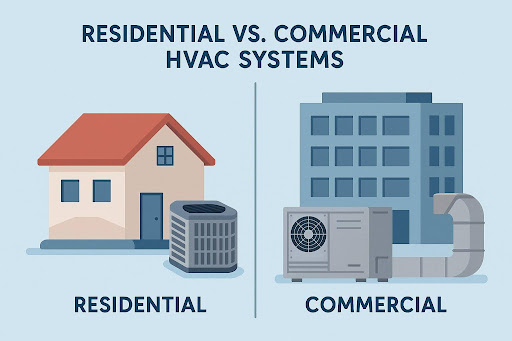HVAC (heating, ventilation, and air conditioning) systems exist in two varieties. The distinctions between HVAC systems in homes and businesses extend beyond factors like size and complexity. Whether you own a company or a house, being aware of these important distinctions can help you make wise choices about installation, upkeep, and repairs.
What is the Difference between Residential and Commercial HVAC Systems?
| Feature | Residential HVAC Systems | Commercial HVAC Systems |
| Size & Capacity | Smaller, designed for single-family homes | Larger, designed for buildings with high occupancy |
| Complexity | Simple ductwork, single thermostat | Advanced zoning, multiple thermostats, and more components |
| Installation Location | Usually installed outside (backyard) or in basements/attics | Installed on rooftops to save space and reduce noise |
| Power & Energy Consumption | Lower energy consumption, optimized for smaller spaces | Higher energy demand, built for continuous operation |
| Maintenance Needs | Less frequent maintenance, simpler repairs | Requires frequent maintenance by commercial HVAC technicians |
| Ventilation & Airflow | Basic air circulation for comfort | Advanced ventilation for large spaces, often with air purification |
| Customization | Standardized systems with few modifications | Highly customizable for building-specific requirements |
Key Differences in Residential vs. Commercial HVAC:
-
Complexity and Size:
The purpose of residential HVAC systems is to effectively heat and cool smaller areas. They usually possess:
- One heater or air conditioner
- Simple ducting with little zoning;
- A single thermostat for the whole house
The difference between home and commercial HVAC systems, however, is that the former are designed to sustain huge structures, such as warehouses, retail malls, and offices. These systems:
- Employ intricate air distribution and ducting systems;
- Have several heating and cooling zones;
- And have numerous thermostats for accurate temperature control.
-
Installation and Placement
- Attics, basements, and a home’s side or backyard are the typical locations for residential HVAC systems.
- In order to conserve space and lower internal noise, commercial HVAC systems are frequently installed on rooftops. Additionally, its location facilitates maintenance by commercial HVAC professionals without interfering with corporate activities.
-
Power Consumption and Efficiency
Commercial HVAC systems use more energy than residential ones because of their bigger scale. While home systems turn on and off as required, they are made to run continuously in busy settings.
Many commercial systems include the following features to increase efficiency:
- Smart zoning for optimal temperature regulation;
- High-performance air filtration systems;
- And variable refrigerant flow (VRF) or variable air volume (VAV) technologies
-
Repair and Maintenance Expenses:
- The intricacy of commercial HVAC systems need regular service, but residential HVAC systems require less frequent maintenance since they contain fewer moving components. Professional commercial HVAC specialists are frequently employed by businesses to perform complex maintenance duties.
-
Zoning and Customization:
The degree of customization varies between HVAC residential and commercial systems, while domestic HVAC systems are often more conventional.
- Commercial HVACs allow for many zones, allowing companies to regulate separate areas independently, increasing comfort and efficiency. Residential HVACs feature one or two zones with a single thermostat.
Choosing the Right HVAC System:
Homeowners will find a domestic HVAC system more cost-effective and adequate for their needs. However, if you operate a company or commercial building, you must invest in a commercial HVAC system to maintain temperature control, air quality, and customer and staff comfort.
Conclusion:
In order to make an informed choice, it is crucial to comprehend the main distinctions between HVAC systems for homes and businesses. Whether you are a company owner, property manager, or homeowner, making the appropriate HVAC system investment guarantees cost-effectiveness, energy efficiency, and the best possible interior comfort. With skilled residential and commercial HVAC solutions catered to your needs, Go Green Heating & Cooling is ready to assist if you want experienced advice.


Related Stories
The Cost Breakdown of Installing a Mini Split AC System
Mini split air conditioning systems are changing the way homeowners think about cooling. Whether you
May
Why Regular Chimney Cleaning Could Save Your Home—and Your Wallet
Nothing says comfort like a warm fire on a chilly night—but what’s going on inside
May
Should Ductwork Be Replaced After 20 Years?
When your HVAC system works hard to keep you comfortable, your air ducts play a
May
Why Dryer Vent Cleaning is Essential for Fire Prevention
Dryer vent cleaning isn’t just about keeping your appliance running better—it’s one of the simplest
May